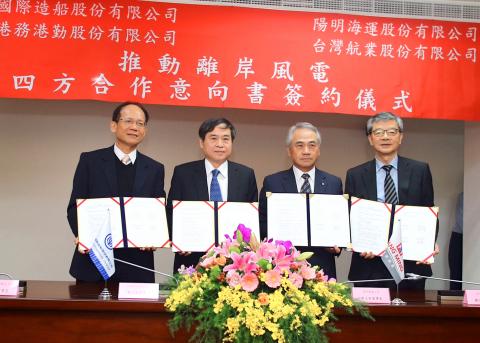CSBC Corp, Taiwan (台灣國際造船) yesterday unveiled an alliance to tap into demand — valued at about NT$30 billion (US$974.6 million) annually — for marine services from Taiwan’s emerging offshore wind energy sector.
The nation’s only listed shipbuilder said it inked a memorandum of understanding with Yang Ming Marine Transport Corp (陽明海運), Taiwan Navigation Co Ltd (台航) and state-run Taiwan International Port Corp (TIPC, 台灣港務) to combine the capabilities of Taiwan’s leading shipping and marine engineering companies.
The companies aim to lend their expertise to provide towing and transport for components and materials used to build offshore wind turbines, as well as maintenance services for construction vessels, before tackling advanced vessel repairs, search and rescue operations, and personnel training, CSBC chairman Cheng Wen-lon (鄭文隆) told a news conference.

Photo: Yang Ya-min, Taipei Times
Yang Ming Marine said it would train crew to transport oversized components on long-haul voyages, while Taiwan Navigation would provide experience in towing and dockside operations.
TIPC said that it has fleets of specialized vessels to perform surveying, towing, lifting and maintenance duties at commercial ports in Taiwan, and is to take delivery of two 6,400 horsepower towing vessels to meet demands for offshore wind projects.
TIPC would provide 47 vessels of various types and 409 crew, it said.
The companies said that a separate joint venture might be formed as they accumulate experience and build revenue streams through partnerships with foreign developers.
Meanwhile, CSBC reported a net loss of NT$2.29 billion for last year, narrowing from a loss of NT$3.04 billion in 2017, as the company continues to face pressure from a downturn in the global cargo shipping sector.
Revenue dipped 20.7 percent annually to NT$13.01 billion, it said.
While demand for new cargo vessels has remained in a slump, CSBC said that it has been diversifying into offshore wind projects and military contracts.
Shipbuilding still accounted for 90 percent of CSBC’s revenue last year, it said.
CSBC said it hopes to have its topline support evenly split between commercial and military shipbuilding, and offshore wind power projects.

Sweeping policy changes under US Secretary of Health and Human Services Robert F. Kennedy Jr are having a chilling effect on vaccine makers as anti-vaccine rhetoric has turned into concrete changes in inoculation schedules and recommendations, investors and executives said. The administration of US President Donald Trump has in the past year upended vaccine recommendations, with the country last month ending its longstanding guidance that all children receive inoculations against flu, hepatitis A and other diseases. The unprecedented changes have led to diminished vaccine usage, hurt the investment case for some biotechs, and created a drag that would likely dent revenues and

Global semiconductor stocks advanced yesterday, as comments by Nvidia Corp chief executive officer Jensen Huang (黃仁勳) at Davos, Switzerland, helped reinforce investor enthusiasm for artificial intelligence (AI). Samsung Electronics Co gained as much as 5 percent to an all-time high, helping drive South Korea’s benchmark KOSPI above 5,000 for the first time. That came after the Philadelphia Semiconductor Index rose more than 3 percent to a fresh record on Wednesday, with a boost from Nvidia. The gains came amid broad risk-on trade after US President Donald Trump withdrew his threat of tariffs on some European nations over backing for Greenland. Huang further

CULPRITS: Factors that affected the slip included falling global crude oil prices, wait-and-see consumer attitudes due to US tariffs and a different Lunar New Year holiday schedule Taiwan’s retail sales ended a nine-year growth streak last year, slipping 0.2 percent from a year earlier as uncertainty over US tariff policies affected demand for durable goods, data released on Friday by the Ministry of Economic Affairs showed. Last year’s retail sales totaled NT$4.84 trillion (US$153.27 billion), down about NT$9.5 billion, or 0.2 percent, from 2024. Despite the decline, the figure was still the second-highest annual sales total on record. Ministry statistics department deputy head Chen Yu-fang (陳玉芳) said sales of cars, motorcycles and related products, which accounted for 17.4 percent of total retail rales last year, fell NT$68.1 billion, or

HSBC Bank Taiwan Ltd (匯豐台灣商銀) and the Taiwan High Prosecutors Office recently signed a memorandum of understanding (MOU) to enhance cooperation on the suspicious transaction analysis mechanism. This landmark agreement makes HSBC the first foreign bank in Taiwan to establish such a partnership with the High Prosecutors Office, underscoring its commitment to active anti-fraud initiatives, financial inclusion, and the “Treating Customers Fairly” principle. Through this deep public-private collaboration, both parties aim to co-create a secure financial ecosystem via early warning detection and precise fraud prevention technologies. At the signing ceremony, HSBC Taiwan CEO and head of banking Adam Chen (陳志堅)